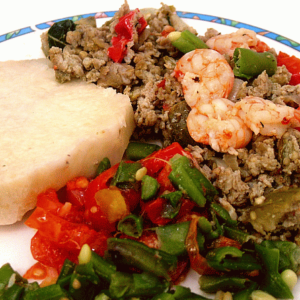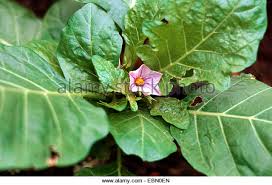Garden egg leaves are not known for their health benefits; not that they don’t possess them, they have in abundance, but the fruits are more popularly known in this regard.
Quick Facts About Garden Egg
Garden eggs, also called egg plants, are vegetables that is cultivated in the humid tropics of Africa, especially West and Central Africa. It is also grown in Asia and India. This plant is useful from root to leaves as they are traditionally used to treat various ailments. Garden egg leaves are abundant in vitamins, minerals, and antioxidants. However, to get these nutrients out of the leaves and benefit from them, you might have to extract the juice out of the leaves, or as is mostly done in some African homes, cook and eat them.
In this article, we will discuss how garden egg leaves are beneficial to the body and you will see why it should be as economically important as its fruits.
Eggplant and Garden Egg Leaves; The Difference.
It is quite common to mistake garden eggs, also called egg plants, for the particular crop we’re discussing. While the eggplant, Solanum melongena, has its fruits as the economic important part, garden egg, Solanum aethiopicum, has its leaves as the economic important part. This is because garden egg leaves are more nutritious than the fruits.
Both eggplant and garden egg are similar in every respect except the fruit. While the fruit of the eggplant can be elongated or oval with serrations on its body, depending on its variety, the garden egg’s fruit is usually smaller and never elongated. Garden eggs are bitter.
The both have large green leaves.
Benefits of Garden egg Leaves
Garden egg leaves are tremendously beneficial to its consumers health-wise. It is rich in antioxidants, vitamins, and minerals, as well as it is abundant phytochemicals. A study of the leaves exposes its chemical properties as shown below:
| Parameters | Concentration |
| Moisture | 91.4% |
| Crude Protein | 8.31% |
| Crude Fiber | 6.22% |
| Calories | 308.9 |
| PHYTOCHEMICALS | Composition (mg/100g) |
| Alkaloids | 0.60 |
| Tannins | 2.45 |
| Oxalate | 22.95 |
| Flavonoids | 26.70 |
| Saponins | 14.40 |
| Cyanogenic glycosides | 5.7 |
| MINERAL ELEMENTS | Concentration (mg/100g DW) |
| Phosphorus | 1085.00 |
| Iron | 326.50 |
| Calcium | 15.29 |
| Potassium | 216.89 |
| Magnesium | 39.14 |
| Manganese | 147.78 |
| Sodium | 149.34 |
| VITAMINS | |
| Vitamin B2 | 0.036 |
| Vitamin C | 6.273 |
| Vitamin E | 0.140 |
From the table showing the chemical composition of garden egg leaves above, it is evident that the leaves are packed with minerals, vitamins, and phytochemicals. These are the reason for its importance and the benefit it bestows.
Let us have a look at the health benefits it gives when consistently consumed.
Promotes Fertility
Garden egg leaves have been used to treat infertility issues in men traditionally for a long time now. It is believed that the fruit is a symbol of fertility and its leaves therefore will bestow whoever drinks its juice with improved fertility.
Although this is unproved scientifically, it is possible that the presence of phytochemicals and minerals such as potassium could be responsible for improved sexuality.
Improves Kidney health
It is said that garden egg leaves have been used to treat uterine complaints by traditionalists. This could be possible due to the action of antioxidants such as vitamin c and other phytochemicals such as the alkaloids and flavonoids as they help to get rid of toxins from the body.
The juice of the leaves is extracted by boiling them and filtering it into a jar. It is recommended that the juice be taken at least thrice daily. Alternatively, the leaves could be eaten raw.
The mineral, potassium is also known to help maintain, and improve if need be, the health of the kidney. Consistent use of garden egg leaves helps to prevent kidney issues and the consequent dialysis that follows its failure.
Promotes Foetal Health
Garden egg leaves are loaded with nutrient; proteins, vitamins, minerals, antioxidants, you name them. It is therefore a very good food choice for expecting mothers. It not only nourishes the mother with much needed nutrients it also helps the foetus grow with minimal fat and cholesterol, to become and healthy baby without defects on delivery.
Encourages weight loss
Weight loss is not an easy journey, especially when you keep doing all you can but your diet isn’t helping. Garden egg leaves are rich in protein and fiber; this means you get to eat and get full on time while you’ve consumed little calories. That’s not all, you also feel fuller for longer since protein doesn’t break down as fast as carbs.
In essence, it helps you eat less and keeps hunger – which may drive you to eat snacks – at bay.
Ensures heart health
To maintain the health of your heart, your diet needs to be rich in minerals such as potassium as it helps to regulate heartbeat. It is also advisable that you avoid fats and cholesterol as an accumulation of LDLs is detrimental to the cardiovascular health you so want to improve.
Garden egg leaves have these nutrients and more for you. Regulate your heartbeat and avoid palpitations with the potassium in the leaves and control the fat content of your diet as you eat the garden egg leaves as a vegetable that it is.
Treats anemia
An important mineral in making blood available in the body is Iron. Iron in plants aren’t readily absorbed by the villi in the small intestine unless there have support from a certain vitamin, vitamin c, which garden egg leaves also happen to be very rich in.
You can either get this mineral from the leaves by cooking it as a vegetable, eating it raw, or macerating the leaves to extract the juice.
Can prevent cancer
Phytochemicals and antioxidants are known to fight against abnormal growth in cells. They are also responsible for the removal of toxins present in the body as free radicals by scavenging on them.
Since these free radicals are known to be notorious causers of inflammation in organs, thereby causing disruption through abnormal growths, it is important that they are eliminated by the consumption of garden egg leaves.
Aids digestion
The friendliest digestion companion is fiber. Fiber aids the human digestive system through it’s the action of its particles that are inert when in contact with digestive enzymes. Garden egg leaves help to move food material through the stomach and to the colon with ease.
It also aids in the avoidance and resolution of constipation due to its fiber content.
Fights Insomnia
If you are having difficulty getting sleep, inclusion of garden egg leaves might just do the trick. It contains minerals and vitamin that help to make sleep easier and better. With iron, calcium, magnesium, Vitamin E and Vitamin B2 being constituents of the leaves, they are capable of inducing sleep and giving you a better sleep.
Balances Blood Sugar
Wherever there is a food that is good for the cardiovascular muscles and helps to promote weight loss, there is every likelihood that it is low in glycemic index or rich in fiber or even both. In this case, the garden egg leaves are rich in nutrients that enhance overall health and specifically, it is rich in fiber and protein. That translates to lesser amount of simple sugars and more time spent in digestion.
All of these makes garden egg leaves a food suitable for diabetic patients as it will break down steadily and release glucose to the blood steadily.
How to prepare Garden egg Recipes

How TO Prepare Garden Egg Sauce/Eggplants with Boiled Yam, Shrimps, Eggs And Smoked Fish.
Ingredients
- 1 Tuber Yam
- 6 Pieces Garden egg igba
- 6 Chicken eggs
- 3 Fresh tomatoes
- 2 Large Onion
- 3 Small red chilli peppers
- 1 ½ tbsp Cooking spoon Vegetable oil or cooking oil of your choice
- 20 g Shrimps
- 1 Piece of Smoked Fish
- 1 Can of Sardine Corn beef
- Optional seasoning thyme, Maggi, curry
Instructions
- Step 1 Slice the yam into round pieces, use a knife to cut it and put it in a pot of water peel the back away before you do so. Put a garden egg in a thick black paper bag and boil it either separately or with the yam. Add a little sugar or salt to the yam if needed.
- Step 2 If the garden egg is boiled and soft, pound or marsh with a small mortar or spoon.
- Step 3 In a deep frying pan, add 1 1⁄2 cooking spoons of vegetable oil or your desired cooking oil, slice a few onions, some tomatoes and red chilli peppers, then cook for 1 min.
- Step 4 Add the sardine/corn beef, smoked salmon, shrimp and eggs from the garden. Meanwhile, in a cup, whisk some chicken eggs with a little bit of thyme, curry and a Maggi cube.
- Step 5 By adding very few slices of scent leaves or herb spices of your choice, the egg mix and some seasoning, continue frying, then fry and stir all together for 3-4 minutes.
- Step 6 Cook yam to tender, test with a fork and serve as pictured above. Cook, until the yam is tender, test with fork or knife to be sure, is soft. Then, Serve.
Conclusion
Garden egg leaves are important vegetable leaves, nutritionally speaking. They also have the potential to become economically important, as they are in Northern Italy, once the information about their numerous health benefits have circulated.
It is preferable to cook and eat the garden egg leaves as vegetables, accompanied by any swallow of your choice in order to benefit from its goodness.
Related reading
- Disadvantages of Garden Eggs You Never Knew
- 27 Vegetables in Nigeria, Types, Recipes and More. Go Green!
- How to Prepare Garden Egg Sauce (Eggplants) Recipes




